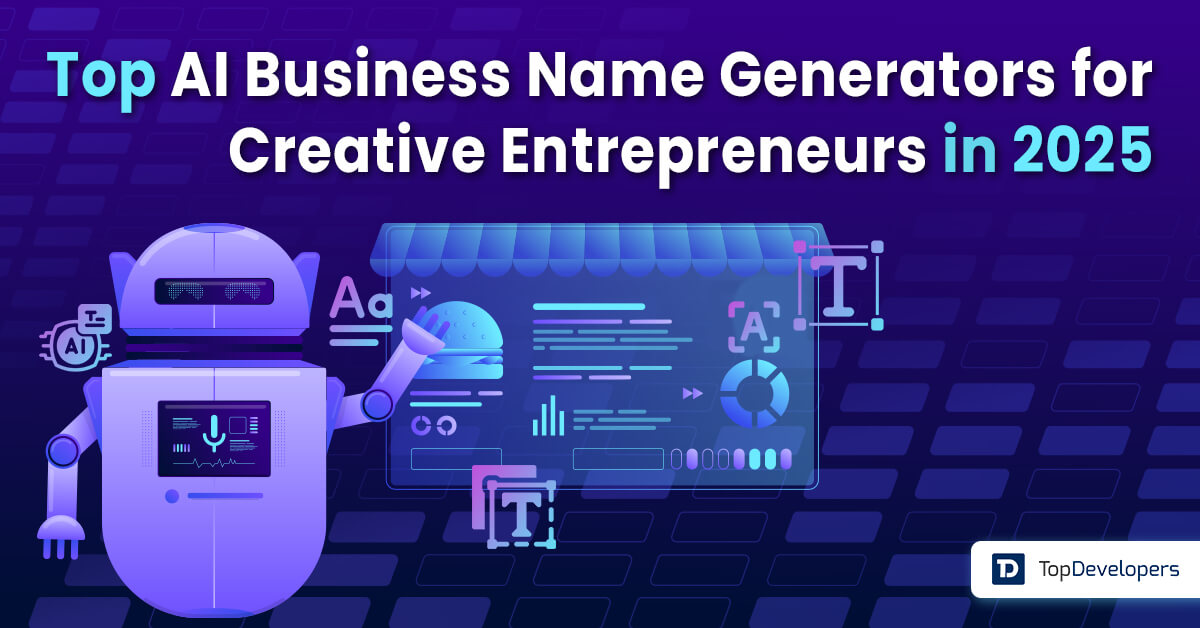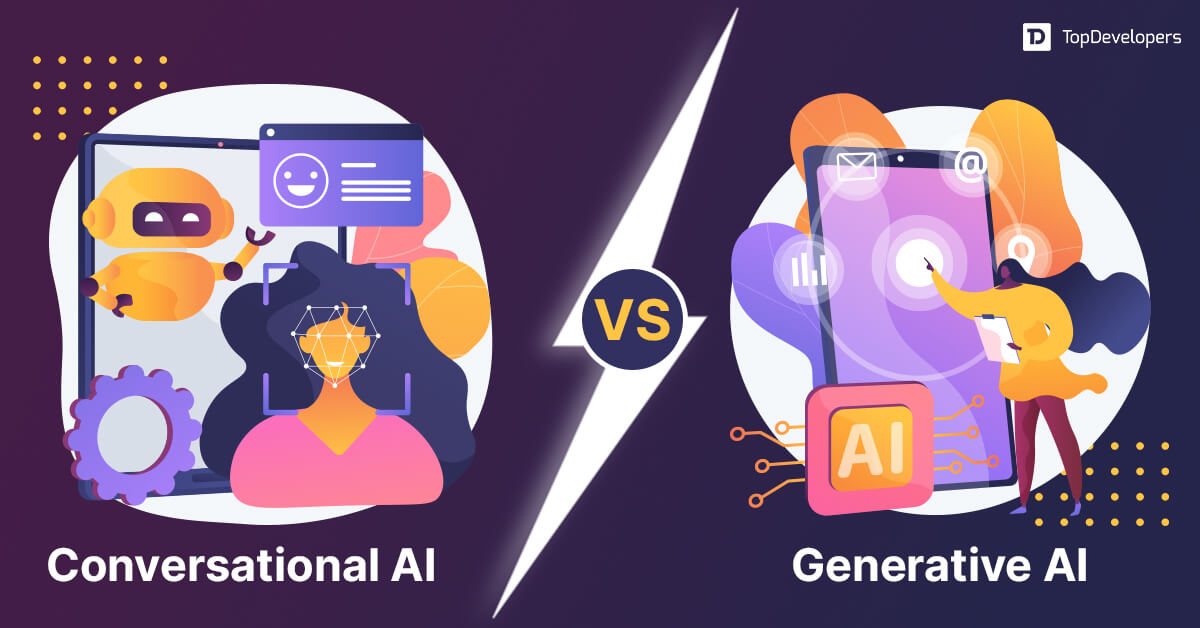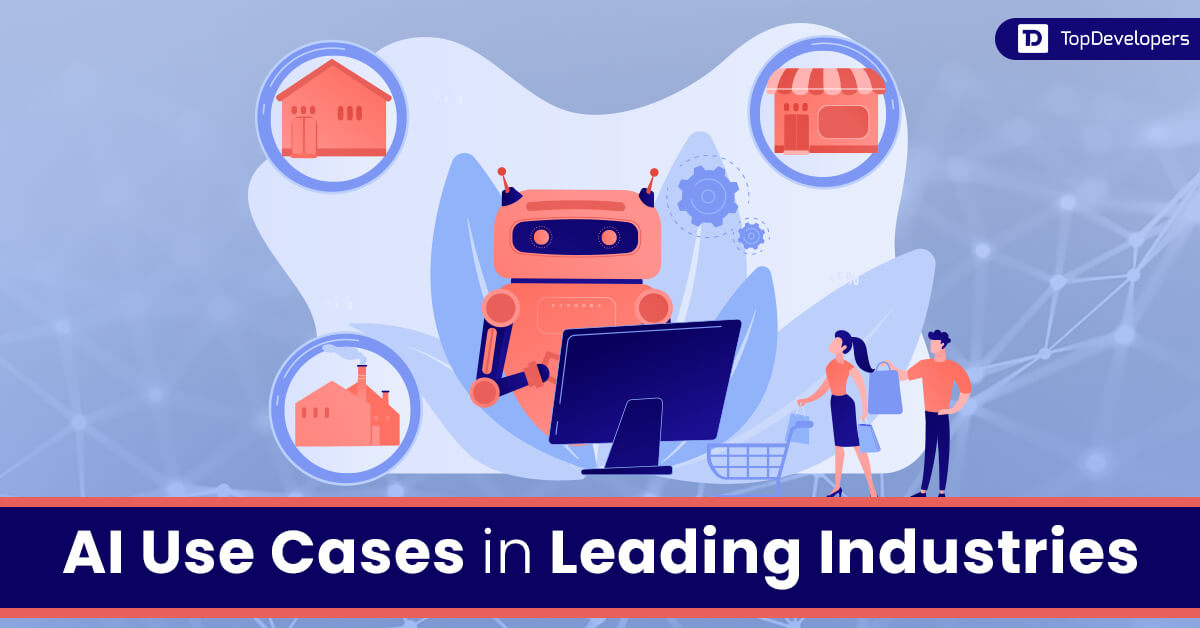
Artificial intelligence has evolved beyond general-purpose applications, giving rise to a new generation of specialized systems known as Vertical AI Agents. Unlike traditional AI models that serve broad and generic functions, these advanced solutions are designed to understand and operate within specific industries such as healthcare, finance, manufacturing, and retail. This targeted approach allows businesses to achieve faster automation, deeper insights, and higher efficiency tailored to their exact operational needs.
According to a report by Grand View Research, the global AI market is projected to grow at a compound annual growth rate (CAGR) of 36.6% from 2024 to 2030, reflecting the rapid adoption of specialized AI systems across industries.
Vertical AI Agents are redefining how global enterprises and professional service providers streamline processes. They combine domain-trained data models with real-time analytics to deliver quality, industry-ready automation. As businesses look for smarter, faster, and more professional AI tools, vertical agents have emerged as the top choice for achieving measurable results without the heavy customization required by general AI systems.
Whether it is optimizing supply chains, enhancing fraud detection, or delivering personalized customer experiences, Vertical AI Agents bring precision and adaptability to every business layer. In this guide, we will explore what these agents are, how they work, why they are gaining popularity, and the practical steps businesses can take to implement them effectively.
Table of Contents
What Are Vertical AI Agents?
Vertical AI Agents are specialized artificial intelligence systems built to serve the distinct needs of specific industries or business domains. Unlike traditional or horizontal AI models that perform general tasks across sectors, these advanced agents are trained on domain-specific data and workflows, making them highly accurate, relevant, and ready for professional use.
A Vertical AI Agent understands the unique processes, challenges, and regulatory requirements of an industry, whether it is finance, healthcare, manufacturing, logistics, or retail. This deep contextual awareness allows the system to deliver faster insights, improve decision-making, and support business-critical functions with precision. As a result, modern enterprises are increasingly relying on leading Vertical AI Agents to achieve quality automation and measurable performance outcomes.
What makes Vertical AI Agents stand out is their ability to adapt quickly to evolving market conditions while maintaining a strong focus on efficiency and compliance. They are not built for generic problem-solving but are designed as expert systems that provide fast, professional, and scalable solutions. Businesses adopting these advanced AI tools experience improved operational agility and reduced dependency on manual intervention, giving them a strong competitive advantage in a fast-paced digital ecosystem.
How Do Vertical AI Agents Work?
Vertical AI Agents operate through a systematic and intelligent workflow designed to deliver fast, professional, and quality automation for specific industries. Their functioning involves a multi-stage process that combines data engineering, model training, and real-time analytics to create ready-to-deploy AI systems that align perfectly with business operations.
Step 1. Industry Data Identification and Preparation
The working process of Vertical AI Agents begins with the identification and preparation of industry-specific data. This includes detailed datasets from operational records, customer behavior, financial transactions, compliance reports, and product performance logs. The purpose of this stage is to ensure that the agent understands the language, context, and real-world patterns of the target industry.
Step 2. Domain-Centric Model Training
After collecting and cleaning the data, Vertical AI Agents undergo domain-centric training. This phase involves using advanced machine learning algorithms that learn the business rules, market patterns, and decision-making logic of a particular sector. For instance, a Vertical AI Agent built for the healthcare industry focuses on clinical diagnosis and patient insights, while one developed for finance emphasizes fraud detection, credit scoring, and compliance tracking.
Step 3. Integration into Enterprise Systems
Once the training phase is complete, the Vertical AI Agent is integrated into the company’s digital ecosystem. It connects seamlessly with tools like ERP systems, CRM platforms, and data analytics software. This integration allows businesses to automate workflows such as report generation, predictive maintenance, and customer engagement, ensuring fast and consistent delivery across departments.
Step 4. Real-Time Processing and Decision Intelligence
When deployed, Vertical AI Agents analyze live data, detect trends, and provide instant decision support to business leaders. They process information in real time to identify risks, predict outcomes, and recommend data-driven actions. This capability enables businesses to operate more efficiently, respond quickly to challenges, and maintain a competitive edge in their industry.
Step 5. Continuous Learning and Performance Optimization
The final stage of the process focuses on improvement. Top Vertical AI Agents continuously learn from new data, feedback, and performance metrics. Over time, they refine their analytical models and improve prediction accuracy, allowing enterprises to achieve long-term reliability, faster automation, and consistent quality output.
Best Vertical AI Agents work as intelligent, evolving systems that bring together domain expertise and modern automation to help businesses make smarter, faster, and more profitable decisions.
Why Vertical AI Agents Are Gaining Popularity?
Best Vertical AI Agents are quickly becoming one of the most trending innovations in enterprise automation. Their rise in popularity is driven by the growing need for industry-specific intelligence that delivers faster, more professional, and higher-quality results compared to traditional AI solutions. Businesses today demand AI systems that not only process information but also understand their sector’s operations, regulations, and customer behavior. Vertical AI Agents meet this need by combining precision, adaptability, and speed.
Tailored for Industry-Specific Needs
One of the most powerful advantages of Vertical AI Agents is their ability to focus exclusively on a particular domain. Whether it is healthcare, logistics, finance, or retail, each agent is designed to handle the distinct challenges and workflows of that industry. This specialization allows enterprises to achieve better accuracy, faster deployment, and measurable performance improvements without the extensive customization required by general AI systems.
Real-Time Decision-Making and Efficiency
Businesses are increasingly relying on Vertical AI Agents to make instant decisions based on real-time data. These agents analyze transactions, customer interactions, and operational metrics in seconds, enabling companies to respond quickly to market changes and customer demands. The result is a fast and efficient decision-making environment that minimizes human errors and reduces operational costs.
Alignment with Digital Transformation Goals
Modern enterprises are focusing on digital transformation strategies that emphasize automation, scalability, and agility. Vertical AI Agents align perfectly with these goals by offering ready-to-use, domain-specific solutions that enhance productivity and streamline complex operations. Their ability to integrate easily into existing systems makes them one of the best choices for business leaders looking to implement smart automation without disrupting workflows.
Expanding Use Across Key Industries
The adoption of Vertical AI Agents is spreading rapidly across professional sectors.
- In finance, they help identify fraud patterns and improve risk analysis.
- In healthcare, they support diagnostics and patient engagement.
- In retail, they optimize inventory, pricing, and customer personalization.
Each of these applications demonstrates how these top AI systems are creating new standards for efficiency and business growth.
As more organizations recognize the measurable value of domain-trained intelligence, top Vertical AI Agents are set to become an essential part of the modern business ecosystem, offering fast, scalable, and quality-driven automation across industries.
Key Benefits of Vertical AI Agents for Businesses
Vertical AI Agents are transforming how modern enterprises operate by combining industry knowledge with intelligent automation. They are designed to help businesses achieve fast, quality, and measurable results by reducing inefficiencies, strengthening decision-making, and increasing operational performance. Below are the most significant benefits that make Vertical AI Agents a top choice for professional and forward-thinking companies.
Enhanced Productivity and Process Optimization
Popular Vertical AI Agents streamline time-consuming and repetitive workflows that once required manual effort. By automating domain-specific operations such as financial analysis, logistics planning, or medical reporting, they help enterprises achieve faster turnaround and higher productivity. The ability to process large volumes of data with precision ensures that teams can focus on strategic and creative tasks, driving overall business efficiency.
Reduced Costs and Manual Dependencies
One of the best advantages of implementing Vertical AI Agents is the reduction in operational costs. These agents lower human resource dependency by automating data processing, analytics, and routine decision-making. Businesses experience fewer errors, reduced downtime, and better resource utilization. Over time, this leads to measurable cost savings and a faster return on investment.
Competitive Advantage Through Specialized Intelligence
Latest Vertical AI Agents provide industry-specific intelligence that general AI systems cannot match. Their deep understanding of business workflows allows them to predict trends, identify risks, and offer quick solutions tailored to the company’s environment. This gives enterprises a strategic advantage, helping them innovate faster and maintain leadership in competitive markets.
Faster Time-to-Market with Ready AI Solutions
Vertical AI Agents are pre-trained on domain data, which allows businesses to deploy them quickly without extensive customization or long development cycles. This readiness accelerates the adoption of AI and shortens the time needed to launch new products or services. As a result, companies gain agility and can respond quickly to new opportunities or changing customer demands.
Reliable and Scalable Performance
Unlike traditional AI models that require ongoing manual adjustments, Vertical AI Agents continuously learn from real business data. Their adaptive capabilities improve accuracy and scalability as business operations grow. This ensures that enterprises enjoy long-term reliability, consistent performance, and a professional-grade automation system that evolves with their needs.
The growing adoption of popular Vertical AI Agents across industries proves their ability to deliver fast, specialized, and quality-driven automation that enhances productivity, reduces costs, and supports sustainable business growth.
Comparison — Vertical AI Agents vs. General AI Models
As artificial intelligence continues to evolve, enterprises often face the question of whether to adopt Vertical AI Agents or rely on general AI models. While both approaches harness the power of machine learning and automation, their objectives, capabilities, and outcomes differ significantly. Understanding this distinction helps business leaders choose the best technology for their specific needs.
Focus and Purpose
Vertical AI Agents are developed to serve a single industry or business domain. They are designed to handle the unique language, regulations, and workflows of a sector such as healthcare, finance, logistics, or retail. In contrast, general AI models are broad systems that can perform various generic tasks, such as text analysis, image recognition, or language processing, without deep contextual understanding. The focused design of Vertical AI Agents allows businesses to achieve faster and more accurate outcomes tailored to their field.
Customization and Adaptability
General AI solutions often require extensive customization before they can be effectively used in an enterprise environment. They need to be trained, tuned, and integrated with sector-specific data, which consumes time and resources. Vertical AI Agents, on the other hand, are pre-trained with industry data and ready for immediate implementation. Their built-in adaptability allows companies to experience fast deployment and quick measurable results.
Performance and Accuracy
Latest Vertical AI Agents consistently outperform general models in terms of precision and operational efficiency within their specific domain. Since they understand industry-specific terminology and decision patterns, they deliver quality insights and reliable automation. General AI models provide versatility but may struggle with accuracy in specialized applications where contextual knowledge is crucial.
Integration and Scalability
Vertical AI Agents are built for seamless integration with business tools such as ERP, CRM, and analytics platforms. Their architecture supports easy scalability as the enterprise grows. General AI systems may require additional layers of configuration and manual updates to achieve similar compatibility. For enterprises aiming for professional-grade, scalable, and long-term automation, Vertical AI Agents represent a more sustainable investment.
Suitability for Businesses
For organizations seeking general intelligence to perform a wide variety of tasks, general AI models can serve as a useful foundation. However, for businesses looking to optimize performance, reduce costs, and gain a competitive edge in their specific domain, Vertical AI Agents are the superior choice. They provide fast implementation, industry expertise, and consistent, high-quality results.
In summary, while general AI models offer flexibility, Vertical AI Agents deliver the focused intelligence, speed, and professional accuracy that modern businesses need to stay ahead in competitive markets.
How to Implement Vertical AI Agents in Your Business?
Implementing Vertical AI Agents in a business requires a structured and strategic approach. The process should focus on aligning technology with real operational goals, ensuring smooth integration, and measuring long-term value. When executed properly, Vertical AI Agents can deliver fast, high-quality automation and measurable improvements in productivity, cost-efficiency, and decision accuracy.
Step 1. Assess Business Needs and Identify Use Cases
The first step is to identify the specific processes or functions that can benefit most from AI-driven automation. Business leaders should analyze areas such as customer service, logistics, financial management, or production operations where efficiency gaps exist. Selecting the right use cases ensures that the implementation of Vertical AI Agents directly supports core business objectives and generates clear value.
Step 2. Choose the Right Vertical AI Partner or Platform
Selecting a trusted AI partner or solution provider is critical for success. Businesses should evaluate vendors based on domain expertise, quality of AI models, scalability, and post-deployment support. Leading enterprises often prefer ready-to-deploy Vertical AI Agents that are already trained on industry data and can integrate quickly with minimal configuration. This ensures fast implementation and reduces the burden on internal IT teams.
Step 3. Prepare and Integrate Data Sources
Accurate and comprehensive data is the foundation of every effective AI system. Companies must collect, clean, and organize data from internal systems such as CRMs, ERPs, or supply chain tools. The chosen Vertical AI Agent should then be integrated into these platforms to ensure continuous data flow and real-time insights. A well-connected system enables professional-grade automation across business departments.
Step 4. Pilot Implementation and Performance Evaluation
Before scaling AI across the enterprise, it is advisable to run a pilot project. This allows business leaders to evaluate the performance, accuracy, and efficiency of the Vertical AI Agent in real-world conditions. Feedback collected from the pilot phase can help fine-tune the system and ensure it meets quality and compliance standards.
Step 5. Scale, Monitor, and Continuously Improve
Once the pilot phase delivers positive results, businesses can expand the deployment across other departments or regions. Continuous monitoring is essential to track performance metrics, identify new opportunities, and ensure the AI system evolves alongside business needs. Vertical AI Agents are designed to learn and adapt, providing scalable intelligence that grows with the enterprise.
By following these steps, businesses can implement Vertical AI Agents in a structured and professional manner, ensuring a balance between technological innovation and operational stability. When aligned with strategic goals, these top AI solutions can help companies achieve faster decision-making, improved productivity, and a lasting competitive advantage.
Conclusion
Vertical AI Agents are transforming how modern businesses use artificial intelligence to achieve efficiency and precision. By combining industry-specific data, real-time analytics, and adaptive learning, they deliver fast, reliable, and professional automation that general AI systems cannot replicate. Their growing adoption among global enterprises highlights a shift toward focused, domain-driven intelligence that produces measurable results in productivity, cost reduction, and operational quality.
For forward-thinking businesses and AI companies, Vertical AI Agents represent the next stage of intelligent innovation. They integrate deep industry expertise with scalable, ready-to-use technology, enabling consistent performance without the need for complex customization. From improving workflow accuracy to accelerating data-driven decisions, Vertical AI Agents are shaping a future where automation aligns seamlessly with business goals.
As industries continue to evolve and data becomes more central to success, Vertical AI Agents will remain a core element of enterprise transformation. Their precision, adaptability, and efficiency make them essential for businesses and AI companies aiming to lead in the era of intelligent automation.
 Gillian Harper
| Nov 12, 2025
Gillian Harper
| Nov 12, 2025
A professionally engaged blogger, an entertainer, dancer, tech critic, movie buff and a quick learner with an impressive personality! I work as a Senior Process Specialist at Topdevelopers.co as I can readily solve business problems by analyzing the overall process. I’m also good at building a better rapport with people!


